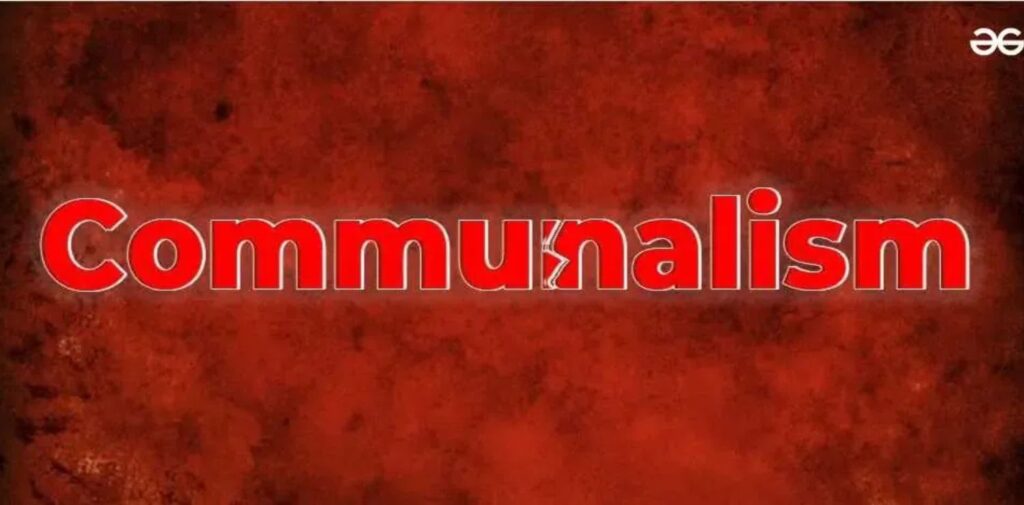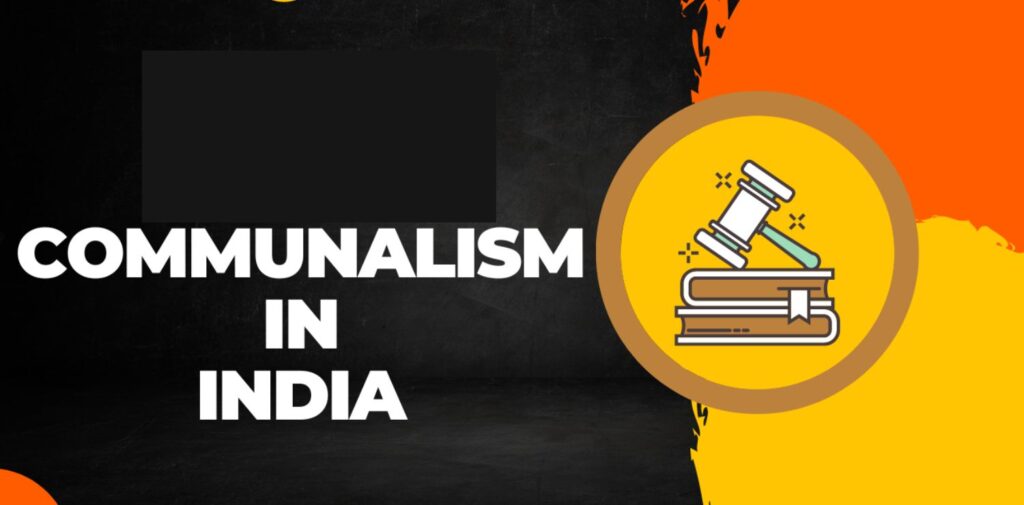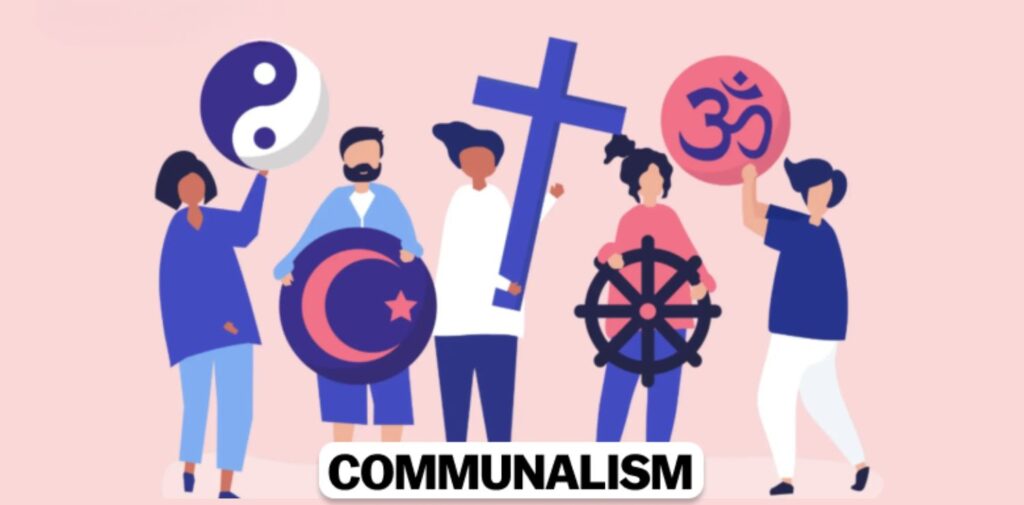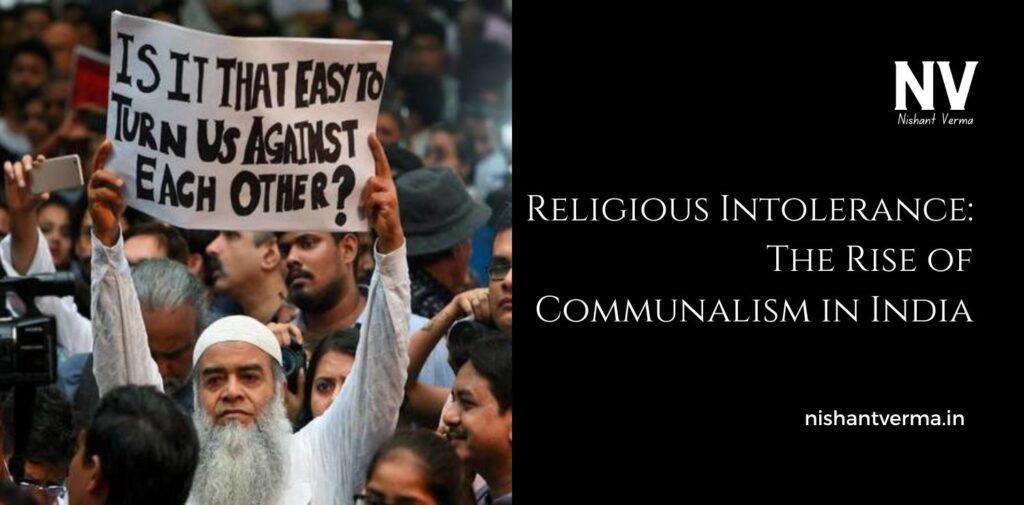India, a country with diverse cultures, languages, and religions, has always been a symbol of unity in diversity. However, over the years, there has been a rise in religious intolerance and communalism, which have threatened the harmony and peace of the nation. To understand this better, let’s look at the history, causes, and effects of communalism in India.
What is Communalism?
Communalism refers to the belief that people from different religious communities should be divided and kept apart. It often leads to hatred and violence between different religious groups. In India, communalism became a serious problem as the country moved towards independence from British rule.

A Brief History of Communalism in India
India has a long history of religious coexistence. Hindus, Muslims, Sikhs, Christians, and other religious communities lived together peacefully for centuries. However, during British colonial rule, the British adopted a policy of “divide and rule.” They encouraged divisions between different communities to make it easier for them to control the country.
The British rule used religion as a tool to create differences between people. The idea of “two nations theory” started to gain popularity. This theory said that Hindus and Muslims were two separate nations, and they could not live together in a united India. This idea was used by some political leaders to demand a separate Muslim state, which led to the creation of Pakistan in 1947.
The Role of British Rule in Creating Divisions
The British played a significant role in creating divisions between Hindus and Muslims. They created separate electorates for Hindus and Muslims, which made people think of themselves as part of different groups. This encouraged communal identities and led to tensions between different communities.
During the freedom struggle, many Indian leaders, like Mahatma Gandhi, Jawaharlal Nehru, and Sardar Patel, worked hard to bring people together, irrespective of their religion. But, there were also some leaders, like Muhammad Ali Jinnah, who promoted the idea of a separate state for Muslims, leading to the partition of India in 1947.
The Impact of Partition
The partition of India in 1947 was a painful chapter in the country’s history. India was divided into two countries: India and Pakistan. The partition was based on religious lines, with Pakistan being created as a Muslim-majority state, and India remaining a secular nation with a Hindu-majority population. This led to widespread violence, with millions of people being killed or forced to leave their homes.
Families were separated, and large-scale riots broke out between Hindus, Muslims, Sikhs, and other communities. The violence and trauma of partition left a deep scar in the minds of people, which still affects India today.
The Rise of Communalism Post-Independence
After India gained independence in 1947, the country tried to build a new, united identity. However, the seeds of communalism sown during British rule continued to grow. Political parties and certain leaders often used religion as a tool to gain votes. This led to the division of people along religious lines.
In the years following independence, there were several incidents of communal riots between Hindus and Muslims. The 1980s and 1990s saw an increase in such incidents, including the infamous Babri Masjid demolition in 1992. This event sparked widespread violence, resulting in the loss of hundreds of lives.

Why Does Communalism Rise in India?
Several factors contribute to the rise of communalism in India:
- Political Manipulation: Some political leaders use religion to divide people and gain votes. By appealing to one religious group, they create divisions that lead to conflicts.
- Economic Disparities: In many parts of India, religious minorities may feel left out or disadvantaged. This can lead to resentment and the belief that they are being treated unfairly.
- Media Sensationalism: At times, the media plays a role in spreading negative stereotypes about certain communities. Sensational stories of violence or conflicts often get more attention, further increasing the divide.
- Lack of Education: People who are not well-educated are more likely to believe in communal myths and stereotypes. Education is a powerful tool to promote tolerance and understanding among different communities.
- Historical Memories: The trauma of partition still lingers in the minds of many. This historical memory can sometimes be used to fuel hatred and distrust between communities.
The Danger of Communalism
Communalism is dangerous because it divides people. It creates an “us vs. them” mentality that can lead to hatred, violence, and destruction. It undermines the values of unity, peace, and harmony that are essential for the progress of any society.
When people start seeing each other as members of different religious groups rather than as fellow Indians, it becomes easier to justify violence. Communal riots often result in the loss of innocent lives, the destruction of property, and a breakdown in social trust.

The Role of Youth in Combating Communalism
The youth of India play an important role in fighting communalism. Young people have the power to bring about change by spreading awareness, educating others, and promoting harmony. Here are some ways the youth can help:
- Promote Tolerance: Young people can actively work to promote tolerance and understanding among people of different religions. Respecting each other’s beliefs is important for a peaceful society.
- Educate Others: Education is key to combating communalism. The youth can educate themselves and others about India’s rich history of religious harmony and the importance of unity.
- Use Social Media Wisely: In today’s digital age, social media can be a powerful tool. Young people can use it to spread positive messages, counter misinformation, and promote peace.
- Engage in Interfaith Activities: Engaging in interfaith activities, such as cultural exchanges and community service projects, can help build bridges between different religious groups.
The Way Forward
For India to continue on its path of progress, it is essential to address the problem of communalism. Here’s what can be done:
- Promote Secularism: India’s constitution guarantees equal rights to all religions. Promoting the secular values of the constitution can help ensure that people of all religions live peacefully together.
- Ensure Equal Opportunities for All: Addressing the economic and social inequalities faced by religious minorities can help reduce the feeling of resentment and insecurity.
- Encourage Dialogue: Open dialogues between different religious communities can help clear misunderstandings and build mutual respect.
- Strengthen the Rule of Law: The government must ensure that those who spread hatred or engage in violence are held accountable, regardless of their religion or political affiliation.
Conclusion
Religious intolerance and communalism are harmful to the unity and progress of India. By understanding the causes of communalism and working together to promote peace, tolerance, and understanding, we can build a stronger and more united India. The youth have a special role to play in this journey, as they can shape the future of the nation. It is important for everyone to remember that despite our differences, we are all Indians, and together we can overcome the challenges of communalism and create a more inclusive society.




